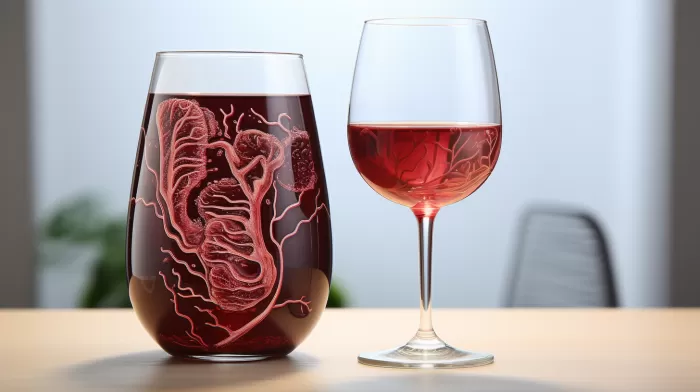If you’ve been sipping a glass of wine each day to promote cardiovascular health, you might want to reconsider. It turns out that a moderate intake of alcoholic beverages might lead to abdominal discomfort for some individuals, says a research study conducted at the American College of Gastroenterology. The researchers found that a daily serving of wine, beer, or spirits could potentially cause a condition known as small intestinal bacterial overgrowth (SIBO).
What is Small Intestinal Bacterial Overgrowth (SIBO)?
SIBO is a condition where an excessive number of microorganisms gather in a part of the intestine that normally has low levels of bacteria. When this occurs, it can lead to gas, bloating, stomach pain, and changes in bowel movements. As the bacteria in the small intestine grow in numbers, they begin using nutrients from food, which can eventually lead to malnourishment.
According to Dr. Scott Gabbard, one of the authors of the study, the typical treatment for SIBO has been antibiotics, probiotics, or a combination of the two. He said, “the question now becomes what is the exact association between moderate alcohol consumption and SIBO and whether alcohol cessation can be used as a treatment for this potentially harmful condition.”
How Alcohol Contributes to SIBO
The human digestive system is designed to break down and process the food we eat with the help of beneficial bacteria. However, when alcohol is introduced into the equation, it can negatively affect the balance of bacteria in our gut, leading to SIBO.
There are a few ways that alcohol can contribute to SIBO:
- Alcohol is a gastrointestinal irritant: Consuming alcohol can irritate the lining of the stomach and intestines, which can lead to inflammation and decreased motility. This, in turn, can cause an imbalance in the gut bacteria and allow harmful bacteria to thrive.
-
Alcohol impairs intestinal permeability: Drinking alcohol on a regular basis can increase the permeability of the intestine, which can lead to harmful bacteria and toxins crossing the gut barrier and entering the bloodstream.
-
Alcohol disrupts the gut microbiome: Regular alcohol consumption can cause a decrease in the number of beneficial bacteria in the gut while permitting harmful bacteria to flourish. Studies have shown that alcoholics tend to have a lower amount of beneficial gut bacteria compared to non-alcoholics.
Can Cutting Back on Alcohol Reduce SIBO Symptoms?
While further research is needed to determine the exact association between moderate alcohol consumption and SIBO, it’s definitely worth considering cutting back or eliminating alcohol from your diet if you’re experiencing symptoms like gas, bloating, and stomach pain.
It’s always important to pay attention to how your body reacts to different foods and drinks. If you’ve noticed that your symptoms seem to worsen after consuming alcohol, it might be worth experimenting with alcohol cessation as a potential treatment for your SIBO.
However, it’s essential to consult with a healthcare professional if you plan to cut out alcohol completely, especially if you currently consume alcohol on a regular basis. They can guide you through the process safely and monitor for any complications that may arise as a result of alcohol withdrawal.
Tips for Maintaining a Healthy Gut
In addition to cutting back on alcohol, there are several other strategies that you can implement to help support a healthy gut:
- Consume a diverse range of plant-based foods: A diet rich in fruits, vegetables, legumes, nuts, and whole grains provides the essential nutrients that beneficial gut bacteria need to thrive. Aim for variety in your diet to encourage a diverse gut microbiome.
-
Get enough fiber: Fiber is an essential nutrient that helps to maintain a healthy gut environment. Good sources of fiber include whole grains, beans, fruits, and vegetables.
-
Include fermented foods: Fermented foods, such as yogurt, kefir, sauerkraut, and kimchi, are natural sources of probiotics that can help to restore balance in your gut bacteria.
-
Manage stress: High levels of stress can negatively impact the gut microbiome and may also worsen SIBO symptoms. Incorporate relaxation techniques and stress management practices into your daily routine, such as deep breathing exercises, meditation, or yoga.
-
Stay hydrated: Drinking enough water is crucial for maintaining overall gut health and reducing the risk of developing SIBO.
In conclusion, while moderate alcohol consumption is often considered beneficial for heart health, it’s important to remember that it could potentially also lead to gastrointestinal issues such as SIBO. If you’re experiencing symptoms, consider cutting back on alcohol and adopting other gut-friendly habits to foster a healthy and balanced gut microbiome.



